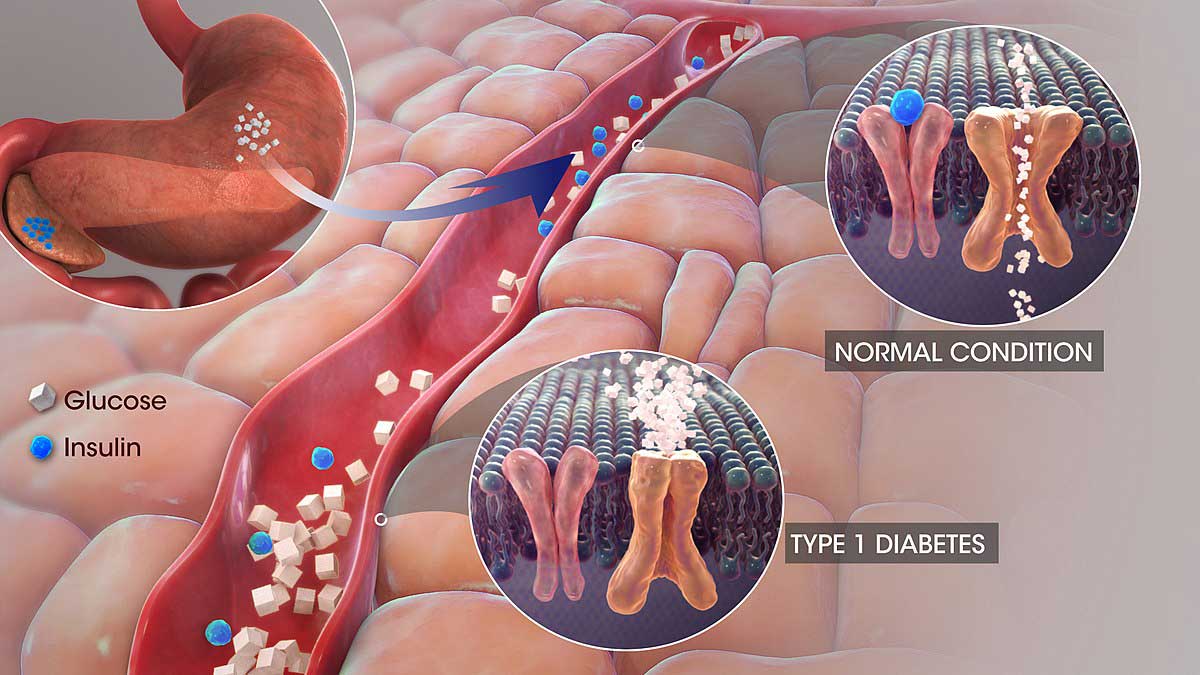What is diabetes?
There are many different types of diabetes, but what these diseases all have in common is high blood sugar levels. This aside, they are all very different diseases, and many people think they shouldn’t share a name – it only confuses things.

Aretaeus of Cappadocia, an Ancient Greek physician, used the term diabetes to describe people with a condition where they passed a lot of urine since diabetes translates from Ancient Greek as ‘a passer through, a siphon’. We now know that frequent urination is a symptom of high blood sugar levels, the defining characteristic of all types of diabetes
So what is type one diabetes (T1D)?
Type one diabetes is an autoimmune disease that destroys the insulin-producing beta cells in the pancreas. As a result, the body loses the ability to produce insulin, leaving everyone with T1D dependent on insulin injections – without them, we can’t survive.
What causes this autoimmune attack?
No one really knows. Genetics certainly plays a part, and when people genetically predisposed come in contact with an environmental risk factor, this is thought to trigger the autoimmune attack of the beta cells. It seems likely that an interaction between the immune system with certain viruses triggers autoimmunity. Other environmental factors being researched include the gut microbiota, vitamin D and dairy intake.
People often question why I’ve got diabetes if I’m fit and healthy. Getting type 1 diabetes isn’t your fault, and it’s not caused by eating too much sugar.

What role does insulin play in metabolism?
You can’t survive without insulin, it’s a key hormone that plays many vital roles. Perhaps most importantly, insulin acts as the ‘key’ to unlock doors into cells, so they can absorb glucose from the blood for energy-requiring processes or store glucose as glycogen or fat for future use. In this way, insulin lowers blood sugar levels.
Opposing hormones such as glucagon raise blood sugar levels, by triggering the release of stored glucose into the blood. Despite the glucose inputs and outputs being in constant flux, in a healthy person blood sugar levels are kept in a tight range from 4.0 to 5.4 mmol/L (72 to 99 mg/dL) when fasting, and only as high as 7.8 mmol/L two hours after eating. This is important because the brain relies on blood sugar to function.

What happens if blood sugar levels go high?

High blood sugar, termed hyperglycemia, occurs when sugar is trapped in the blood, unable to escape without insulin. Your cells are starved of energy so you feel tired, heavy and generally pretty rubbish. Other symptoms are frequent urination (polyuria), increased thirst (polydipsia), hunger (polyphagia), weight loss and blurred vision. Presentation of these symptoms is often the first sign of diabetes, as they were for my diagnosis.
Left untreated, hyperglycaemia leads to the life-threatening state of diabetic ketoacidosis. In the long term, blood sugar levels elevated even slightly can cause complications – damage to the eyes, kidneys, cardiovascular system and nervous system.
What happens if blood sugar levels go low?
Low blood sugar, termed hypoglycemia, causes unpleasant symptoms such as dizziness, nausea, anxiety and cold sweat. If not quickly treated with a sugary snack, unconsciousness, coma and even death can occur.
What does living with type 1 diabetes involve on a daily basis?
With T1D blood sugar control becomes a manual job and daily management revolves around trying to keep blood sugars in the normal range. The correct dosage of insulin has to be calculated, balancing the multitude of factors that affect blood glucose- most significantly carbohydrate consumption and physical activity. It’s an unpaid, full-time job that from the moment you are diagnosed you can never stop doing, and it’s not easy.
So does type 1 diabetes stop you from doing things?
No! While a T1D diagnosis is definitely life-changing, and living with this condition does have its challenges, it does not have to define you or stop you from chasing your dreams. You can do whatever you want. I hope that my adventures will inspire others to see that anything is possible and that T1D shouldn’t stop you from doing anything.

References
| ↑i | https://www.frontiersin.org/articles/10.3389/fimmu.2021.737964/full |
|---|---|
| ↑ii | https://www.sciencedirect.com/science/article/pii/S1472029920301740#fig1 |

Leave a Reply